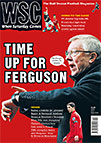 Trains are an important mode of transport for fans but Tom Hocking says that little is done to make them more convenient
Trains are an important mode of transport for fans but Tom Hocking says that little is done to make them more convenient
“In terms of transportation,” read an official FA statement, following the controversy caused by setting the FA Cup final kick-off time at 5.15pm, “a small percentage of Cup final fans use the method of train travel.” The evening start, rather than the traditional 3pm, meant fans of both north-west-based finalists would have trouble catching the last train home. Wigan supporters had already faced similar problems for the semi-final against Millwall and been widely mocked for not selling out their entire ticket allocation. The situation was made more galling by the FA’s solution: use their official coach partner, National Express, instead.
The train has had a long relationship with football. In the beginning very few fans travelled a long distance to matches but as the sport grew in popularity the ease of access to stadiums became an issue. Car use was minimal so just as towns and cities built upon a good water source thrived, so the country’s expanding train stations offered lifeblood for clubs such as Aston Villa and Arsenal to grow.
As away support increased “football specials” were laid on to get fans to and from matches conveniently. However, they became synonymous with the hooliganism that blighted the 1970s and 1980s. The changing attitudes throughout the 1990s, the growing number of out-of-town stadiums replacing their inner-city forebears, plus the ever-increasing use of cars and the rising cost of rail tickets, shifted the way people travelled to matches.
Cars have their advantages: you can leave when you want without risk of missing the departure time and you can also go directly to the industrial-estate stadiums, most of which have been built near motorway junctions, rather than navigating through a town centre. Yet traffic around the majority of grounds remains overcrowded and the cost of parking an added expense on top of tickets and petrol. The widespread anger sparked by the FA’s decision to disregard the needs of those that prefer travelling by train suggests they are slightly out of touch with the common fan’s life. A recent survey by the Campaign for Better Transport (CBT) showed that 23 per cent of fans now spend more on travelling to matches than they do on the ticket – trains have become the most expensive method, ahead of driving alone.
The results also revealed that 35 per cent of people regularly take the train to home games (43 per cent drive), while that figure jumps to 57 per cent for away matches. “A small percentage” understates the proportion of fans using the train as a standard method of getting to games.
With high ticket prices and plenty of spare seats it would be logical for clubs to make reaching the ground as easy as possibly for potential attendees, removing the dubious allure of staying in to watch Jeff Stelling on Soccer Saturday, or spending their ticket money in a pub or shopping centre.
According to the CBT’s survey, 36 per cent of fans would like to use the train more but the prices and non-refundable nature of tickets puts them off. High among the list of improvements away supporters would like was a refund on train fares when kick-off times are moved, so they can book the cheapest tickets far enough in advance without fear of losing out, and free connecting transport from the station to the ground.
Home fans would also like to see free matchday travel on local public transport for ticket holders. In Newcastle, those with season tickets can purchase a “Magpie Mover” for just £10, which covers their travel on transport within the city on matchdays for the season. However, this does not help away fans or occasional match-goers. At the risk of falling into the “Germany does it better” cliche, all their match tickets allow free travel on all local transport around the grounds on the day of the game. This currently exists at Brighton, where their new Falmer Stadium was built next to a train station and parking options are minimal. The frustration is that this is not a widespread policy across English football.
The approach to matchday travel is scattergun at best, with no clear direction or co-operation from those running football or transport. The authorities could get together to make life easier for match-going fans but recent evidence suggests they would be much happier if we all just stayed at home and watched on TV – at least then they could replace our seats with advertising hoardings.
From WSC 316 June 2013